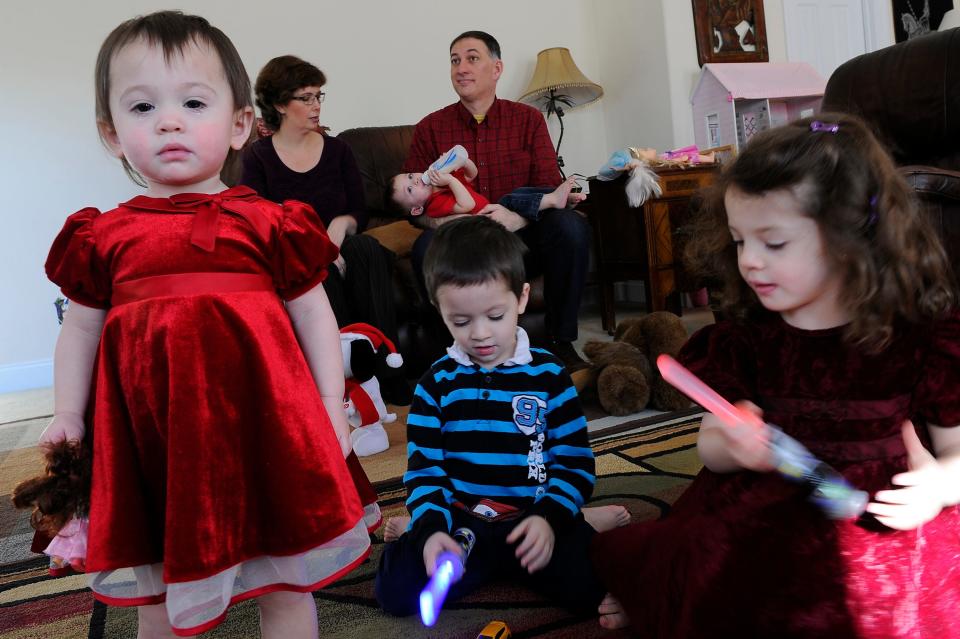Southern Baptists may reject in vitro fertilization, but IVF gave me grandchildren
On June 14, the Southern Baptist Convention at its annual meeting overwhelmingly adopted a resolution condemning in vitro fertilization (IVF). The resolution begins with the language: “Every human being is made in God’s image and is thus to be respected and protected from the moment of fertilization. . . .”
The resolution points out that IVF creates embryos that are not implanted and may eventually be destroyed or used in medical research. Although the resolution goes on to acknowledge the “searing pain” of infertility, it calls upon all Southern Baptists not to use reproductive technology that doesn’t protect every embryo and to advocate for the government to restrain IVF.
I don’t want to change what Southern Baptists believe or practice and some, perhaps, can afford to create and implant one embryo at a time.
But what about the rest of the people in the United States? Should the government forbid parents who are infertile from having children by using IVF because of the religion of one group? Should states prosecute the employees of an IVF clinic for wrongful death when frozen embryos are destroyed?
How does IVF work?
Natural reproduction is a complicated process, requiring healthy eggs, unblocked fallopian tubes that let the eggs be released, healthy sperm with the ability to fertilize an egg, the ability of the embryo to become implanted in the uterus, good embryo quality, and a lot of other factors to bring an embryo all the way to birth.

IVF requires five steps. First, hormones are injected into a woman to promote the development of a number of healthy eggs. The eggs are harvested and then mixed with the partner’s sperm with the goal of creating as many embryos as possible. The embryos are grown for five days (and reach a size of 100 to 250 cells, about the size of a sharp pencil/crayon point) and then one, or sometimes two, are implanted. The remaining embryos are frozen.
Most people go through two to three cycles of IVF before getting pregnant and each cycle costs about $15,000 to $20,000.
Are we “human beings” at the moment the sperm meets the egg?
The attribution of “personhood” can’t be explained by biology. There are too many philosophical and legal aspects to what it means to be a person.

René Descartes, a philosopher living in the 1600’s sometimes credited with being the father of modern philosophy, famously wrote: “I think; therefore I am.” So, perhaps, it’s the ability to think, conscious awareness, that defines us as human beings.
I’m no scholar of religions, but I’m advised that it is widely accepted that a complete ban on abortion is against Jewish law. On that basis, Jewish congregations have brought lawsuits in Florida, Indiana, and Kentucky against the abortion bans enacted there.
Many Buddhists believe that since it is the woman who carries a child, she must make the decision. Accordingly, a Buddhist priest has joined in the lawsuits in Florida along with a Unitarian minister.
Finally, there are those of us who don’t depend on religion in making the determination that a single cell organism is not a human being whose existence and potential destruction someday should keep infertile couples from creating children.
Can or should one religious group prevent infertile couples from having their own biological children?
The First Amendment to the U.S. Constitution states that: “Congress shall make no law respecting an establishment of religion, or prohibiting the free exercise thereof.” In 1947, the U.S. Supreme Court held that this clause, the “Establishment Clause,” prohibited states from making laws that gave certain religious denominations privileges.
I have several grandchildren who would not exist without IVF. They are wonderful, deeply loved, and enrich the lives of their families. The parents really wanted to have children. I always laugh and say: “The village was ready.” If there is a divine being, surely he or she wanted them to exist.
Barbara Moss is the founder of Elder Law of Nashville.
This article originally appeared on Nashville Tennessean: Southern Baptists don't agree with IVF, but what about everyone else?

